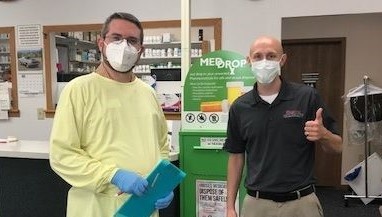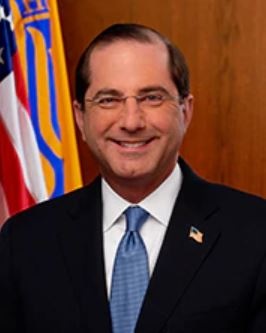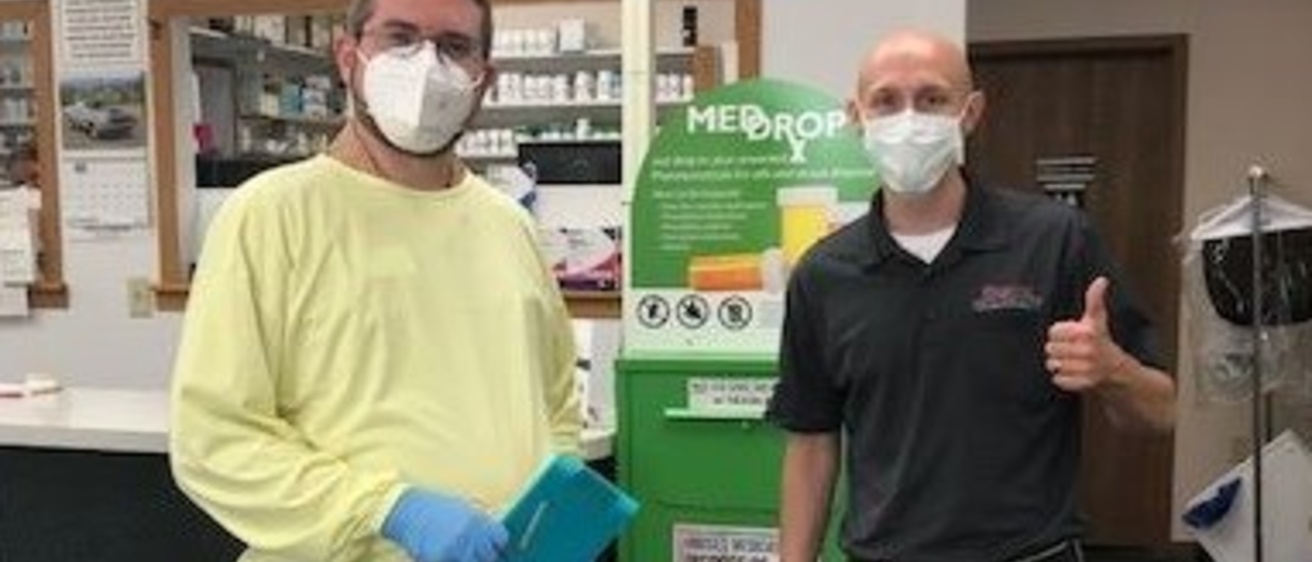Community pharmacists across the state and nation are gearing up to give COVID-19 vaccinations early next year, through a pre-existing grassroots network of pharmacists that is gaining steam. University of Iowa College of Pharmacy faculty, graduate students, residents and alumni are helping lead the charge.
In fall 2019, 30 Iowa pharmacies were among the first selected—along with 20 other teams nationally—to receive national Flip the Pharmacy support to transform pharmacy practice. The initiative is in year two of five, and is funded by the Community Pharmacy Foundation.

Fifteen more pharmacies in the state were added this fall.
Many of the pharmacists involved, as well as their coaches and researchers, who are studying what impact the changes are having, stem from the UI College of Pharmacy. Practitioners and faculty support each other as they continue to move toward new and higher quality, scalable ways to offer “enhanced” services.
Such services go beyond the conventional concept of community pharmacists tallying up and dispensing medicines. Importantly, doing so is how they have traditionally gotten paid as part of the health care system.
However, “pharmacies that don’t provide value-based services are not going to survive, because you cannot make it based on dispensing by itself anymore,” Randy McDonough, an alumnus, has said. McDonough co-owns Towncrest Pharmacy (Iowa City) and Solon Towncrest. He is also the director of practice transformation for the Flip the Pharmacy initiative.
He added that pharmacists—well-educated medication experts—have been doing much beyond getting prescriptions out the door for years. “We're not creating new innovation. We're taking innovation and we're scaling it.”
What does that innovation look like? Some examples:
- Moving pharmacy technicians into new roles, such as immunizers, under a recent Emergency Use Authorization from the U.S. government,
- Documenting pharmacist services in the electronic care plan,
- Strategizing how to better manage blood pressure and diabetes in community members,
- Synchronizing a patient’s medications to a single “pick-up” date every month or every three months,
- and many others.
Flip the Pharmacy is led by a national network of community pharmacists, CPESN USA, which stands for the Community Pharmacy Enhanced Services Network. Iowa’s state network, CPESN Iowa, is one of more than 40 networks that make up CPESN USA.
The pharmacists' network has banded together to demonstrate that they can save money for health plans when paid to use their medication expertise to help their patients get the best results from their medications. “Rather than ‘Is this the right pill in the bottle?’ the pharmacists can ask, ‘Is this the right drug for Mrs. Jones?” explained William Doucette, PhD, a division head and professor in the University of Iowa College of Pharmacy, who will assess the pharmacies’ progress.
Stevie Veach, ’06 PharmD, '07 R, is another College of Pharmacy faculty member and a practicing pharmacist at MercyOne in Dubuque. She is also a pharmacy practice transformation coach for Flip the Pharmacy, and in this role, she oversees the progress of five pharmacies that are expanding or improving their pharmacy services.
Four faculty members and a graduate student are spending 5-10 percent of their work hours on the project:
Student Arwa Al-Khatib, Research;
Jay Currie, Education;
William Doucette, Education and Research;
Laura Knockel, Education;
Stevie Veach, Education and Practice Coach.
“Right now, the pharmacists that are involved in this are not getting paid to make these changes,” Veach said. The grant funds do not directly pay pharmacies; instead going to CPESN to provide coaches. “For pharmacists, it is extra work in the hope that by working together they will all see the benefits down the road: better patient care, patient outcomes, and hope for payment models similar to those used by doctors, to pay for these services to continue in the community.”
“Everybody is very dedicated and motivated to move the needle and help change the future of pharmacy and the practice of pharmacy,” she added.
Last year, the Flip the Pharmacy network worked closely together to control patients’ blood pressure and fight opioid abuse or misuse, which “has been a huge concern with the uptick of COVID,” said Veach.
Then, “when COVID hit, it was great we had this network during that crazy time,” Veach said. “We could rely on each other and share how their pharmacies were adapting to the crisis.”
Flip the Pharmacy coaches are now working on helping their sites ramp up efforts to get patients up to date on recommended vaccines, such as those fighting seasonal flu and others, she said. “This month, as pharmacies are filling a med, they are pulling up the patient’s name in the Iowa Immunization Registry, a state database, to see if they’re missing any important vaccines.”
“With COVID, people aren’t going to their routine doctor as much, or they are using telehealth. By catching individuals up on regular vaccines in the pharmacy right now, when COVID vaccines are distributed in January or February we’ll be ready to go with that too.”
“We’re thinking down the road.”
Recently, it was announced that CPESN network pharmacies—including those in Iowa beyond Flip the Pharmacy—would be among the federal pharmacy partners giving COVID-19 vaccines when available.

The vast majority of Americans live within five miles of a pharmacy, and our new agreement with pharmacy partners across America is a critical step toward making sure all Americans have access to safe and effective COVID-19 vaccines when they are available.
In the press release, U.S. Health and Human Services Department Secretary Alex Azar underscored the importance of pharmacists to health access in the nation. “The vast majority of Americans live within five miles of a pharmacy, and our new agreement with pharmacy partners across America is a critical step toward making sure all Americans have access to safe and effective COVID-19 vaccines when they are available,” Azar said.
“This is a wonderful recognition of the high quality, patient-centered services espoused by the coalition,” added College of Pharmacy Dean and Professor Donald Letendre.
